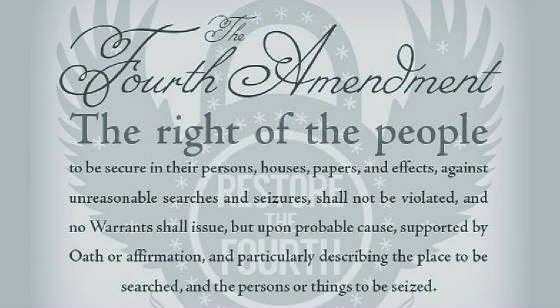 SARTRE
SARTRE
Activist Post
The Bill of Rights is not an accumulation of mere words that have become expendable when the government finds them inconvenient. The Fourth Amendment is especially an example of a promise of protecting natural rights, long ignored and often violated. While much of court precedents involve policing powers, these decisions have profound application to NSA metadata mining. With the first anniversary of the Edward Snowden disclosures, no government official or agency can continue to deny the existence of the total surveillance state.
The NSA’s “General Warrants”: How the Founding Fathers Fought an 18th Century Version of the President’s Illegal Domestic Spying, provides an indispensable example of the fundamental conflict that always exists, when magistrates envision their duty as the maintenance of government supremacy over the inherent autonomy of individuals.
It is “familiar history,” the U.S. Supreme Court noted in Payton v. New York, that “indiscriminate searches and seizures conducted under the authority of ‘general warrants’ were the immediate evils that motivated the framing and adoption of the Fourth Amendment.” When James Madison drafted the Fourth Amendment, he relied heavily on the Massachusetts Constitution, which forbade warrants that did not specify the “persons or objects of search, arrest, or seizure.
Since the post World War II era, the radical shift from the remnants of the former Republic, into a global authority, where the meaning of the law has no correlation to the intent of original constitutional conviction, is undeniable. What was enemy signals interception became complete domestic scrutiny and monitoring. Lost for all practical legal purposes was The Central Meaning of the Fourth Amendment. Tracey Maclin provides a historic account and judicial context on how the Constitution was perverted.
The Court’s rational basis model essentially asks whether the police have acted irrationally while intruding upon the Fourth Amendment rights of individuals. The Court’s model rarely requires warrants authorizing searches, disfavors vigorous judicial oversight of police searches, and prefers deference to police procedures as the mode of constitutional decision-making.
Most importantly, a rational basis model severely diminishes our rights under the Fourth Amendment. As the private container cases demonstrate, a rational basis model does not subject police searches to vigorous judicial check. In many instances, the police are free to undertake unsupervised and suspicionless searches, even when less intrusive means are available to serve the state’s interests. In other contexts, warrantless searches are permitted when the only justification for such a search is police convenience.
In the end, the Court finds that all of these searches are reasonable because they rationally serve legitimate state interests. This degree of deference to police searches is at odds with the central purpose of the Fourth Amendment, which is distrust of discretionary police power. The Fourth Amendment was not inserted in the Bill of Rights so that judges could meekly defer to government intrusions of privacy; rather, the amendment was designed to control such intrusions.
The NSA purports that national security not only encompasses data mining on all citizens, but also allows for effective total immunity from oversight and accountability. This mindset expands the ordinary boundaries of maintaining the peace into a tyrannical police state. The commitment to Open Government and Transparency is as believable as the fairy tale that anyone can become President.
Abdication of judicial responsibility is so blatant that the century old decision by Justice William R. Day, Weeks v. United States (1914), U.S. Supreme Court, has no substantive application when the NSA deems that its ECHELON monitoring systems require that a PRISM be kept on everyone person. Also, watch the video, One Year Of Leaks That Turned Surveillance Conspiracy Theory to FACT!
The point of the Fourth Amendment which often is not grasped by zealous officers is not that it denies law enforcement the support of the usual inferences which reasonable men draw from evidence. Its protection consists in requiring that those inferences be drawn by a neutral and detached magistrate, instead of being judged by the officer engaged in the often competitive enterprise of ferreting out crime. Any assumption that evidence sufficient to support a magistrate’s disinterested determination to issue a search warrant will justify the officers in making a search without a warrant would reduce the Amendment to a nullity, and leave the people’s homes secure only in the discretion of police officers. Crime, even in the privacy of one’s own quarters, is, of course, of grave concern to society, and the law allows such crime to be reached on proper showing. The right of officers to thrust themselves into a home is also a grave concern, not only to the individual, but to a society which chooses to dwell in reasonable security and freedom from surveillance. When the right of privacy must reasonably yield to the right of search is, as a rule, to be decided by a judicial officer, not by a policeman or government enforcement agent.
There are exceptional circumstances in which, on balancing the need for effective law enforcement against the right of privacy, it may be contended that a magistrate’s warrant for search may be dispensed with. But this is not such a case. No reason is offered for not obtaining a search warrant except the inconvenience to the officers and some slight delay necessary to prepare papers and present the evidence to a magistrate. These are never very convincing reasons and, in these circumstances, certainly are not enough to bypass the constitutional requirement. No suspect was fleeing or likely to take flight. The search was of permanent premises, not of a movable vehicle. No evidence or contraband was threatened with removal or destruction, except perhaps the fumes which we suppose in time will disappear. But they were not capable at any time of being reduced to possession for presentation to court. The evidence of their existence before the search was adequate and the testimony of the officers to that effect would not perish from the delay of getting a warrant.
If the officers in this case were excused from the constitutional duty of presenting their evidence to a magistrate, it is difficult to think of a case in which it should be required.
 The cyber environment of digital existence does not void the need for probable cause. However, the NSA does not observe such constitutional needs when the personal computer is the depository of your private papers. Other than advancements in technological communications and archiving, the precedent of the “exclusionary rule”, established in this case, is the ubiquitous causality from NSA collection that vacuums up every byte of data, using the presumption that everyone is a criminal. Even if not charged for an offense at this time, the information awaits future prosecutorial discretion.
The cyber environment of digital existence does not void the need for probable cause. However, the NSA does not observe such constitutional needs when the personal computer is the depository of your private papers. Other than advancements in technological communications and archiving, the precedent of the “exclusionary rule”, established in this case, is the ubiquitous causality from NSA collection that vacuums up every byte of data, using the presumption that everyone is a criminal. Even if not charged for an offense at this time, the information awaits future prosecutorial discretion.
So, when in the case Klayman v. Obama, “On December 16, Richard J. Leon of the Federal District Court for the District of Columbia ruled that the metadata collection program violates the Fourth Amendment”, hopes were high that at least one federal judge had the courage to uphold the Constitution. Metadata and the Fourth Amendment then cites that soon thereafter, the weight and magnate of the intelligence snooping force felt the usual letdown, when American Civil Liberties Union v. Clapper was decided.
On December 27, Judge William H. Pauley III came to the opposite conclusion. Contrary to Judge Leon’s belief that the metadata program has not been effective, Judge Pauley argued that the program could potentially have stopped the 9/11 attacks. However, the crux of his determination was that the Smith precedent applies and that no Fourth Amendment claim can be made out for Americans have no reasonable expectation of privacy regarding the metadata related to their phone calls.
Note the bizarre endorsement of this absurdly twisted legal logic that conveniently destroys the intentional importance of preserving essential privacy that corrupt courts want to make conditional.
Among the requirements for a successful Fourth Amendment claim is establishing that a reasonable expectation of privacy was violated. On this point, the most relevant precedent to the metadata cases is 1979’s Smith v. Maryland, in which the U.S. Supreme Court held that individuals have no reasonable expectation of privacy regarding the telephone numbers they call, for that information is freely provided to telephone companies and it is generally known that telephone companies keep this information in their records.”
Abolishing the expectation of privacy is not subject to the redefining of what are reasonable restrictions that the government places upon its agencies. The reason why the NSA is so dangerous stems from the total lack of observing that the spying on ordinary citizens is a profound repudiation of basic and inalienable rights of each individual.
Such systematic and surreptitious gathering also has No Fourth Amendment right in metadata embedded in posted photo, so say the U.S. Court of Appeals for the Fifth Circuit. Before long, this parade of government inspection and retention will subject even the hermit and the deliberate recluse to a profile third degree. It is a never-ending process until snatching your individual identity is the ultimate outcome.
The snoops view you as an enemy of the state, unless you can prove differently, whereas the reality is that The Strange World of NSA Mind Control is the true foe of the liberty of people and a free nation.
Original article archived here
SARTRE is the pen name of James Hall, a reformed, former political operative. This pundit’s formal instruction in History, Philosophy and Political Science served as training for activism, on the staff of several politicians and in many campaigns. A believer in authentic Public Service, independent business interests were pursued in the private sector. Speculation in markets, and international business investments, allowed for extensive travel and a world view for commerce. SARTRE is the publisher of BREAKING ALL THE RULES. Contact batr@batr.org


Be the first to comment on "The Fourth Amendment, NSA and Metadata"